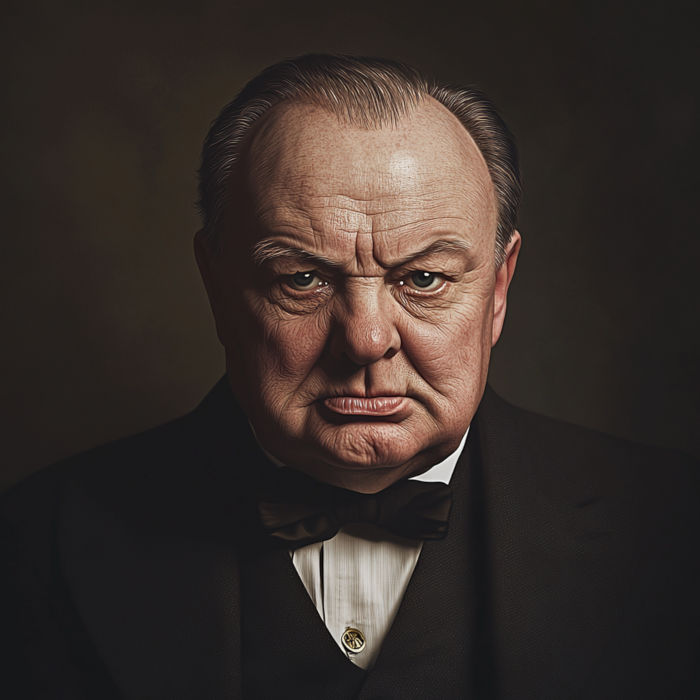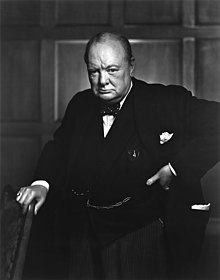


Winston Churchill (1874–1965) was a British statesman, military leader, writer, and one of the most influential figures of the 20th century. He is best known for his leadership of the United Kingdom during World War II, where his indomitable spirit, stirring oratory, and strategic vision were crucial in leading the Allies to victory against Nazi Germany. Churchill's legacy extends beyond the war, as he also played significant roles in British politics, literature, and global diplomacy across a career that spanned several decades.
Birth and Family Background: Winston Leonard Spencer Churchill was born on November 30, 1874, at Blenheim Palace in Oxfordshire, England. He came from an aristocratic family; his father, Lord Randolph Churchill, was a prominent Conservative politician, and his mother, Jennie Jerome, was an American socialite. Despite his privileged background, Churchill's early life was marked by a distant relationship with his parents, particularly his father, who had high expectations for him.
Education: Churchill was initially a poor student and struggled academically, leading to him being sent to various boarding schools. He eventually attended Harrow School, where he began to excel, particularly in history and English. Despite his academic challenges, Churchill was determined to pursue a career in the military. He attended the Royal Military Academy at Sandhurst, where he graduated eighth in his class in 1894.
Military Service and Journalism: After graduating from Sandhurst, Churchill was commissioned as a second lieutenant in the 4th Queen's Own Hussars and was posted to India in 1896. He saw action in various conflicts, including the Malakand Field Force and the Battle of Omdurman in Sudan. During this time, he also worked as a war correspondent, writing dispatches for British newspapers. His experiences in combat and his vivid writing brought him public attention and established his reputation as a brave and insightful observer of military affairs.
Political Ambitions: Churchill entered politics in 1900 as a Member of Parliament (MP) for the Conservative Party, representing the constituency of Oldham. However, in 1904, he switched to the Liberal Party, largely due to his opposition to the Conservative Party's protectionist trade policies. As a Liberal, Churchill held several key positions, including Under-Secretary of State for the Colonies and President of the Board of Trade. He championed social reforms such as the introduction of labor exchanges and unemployment insurance, reflecting his growing interest in addressing social inequality.
First Lord of the Admiralty: In 1911, Churchill was appointed First Lord of the Admiralty, a position in which he played a key role in modernizing the Royal Navy. He recognized the growing threat posed by Germany and was instrumental in preparing the British fleet for what would become World War I.
Gallipoli Campaign: During World War I, Churchill was a driving force behind the ill-fated Gallipoli Campaign in 1915, an attempt to secure a sea route to Russia through the Dardanelles. The campaign was a disastrous failure, resulting in heavy casualties and leading to Churchill's resignation from the Admiralty. Although deeply affected by the failure, Churchill returned to the military and served on the Western Front in France as a battalion commander.
Return to Politics: After the war, Churchill rejoined the government, first as Minister of Munitions and later as Secretary of State for War and Air. In the 1920s, he served as Chancellor of the Exchequer under Conservative Prime Minister Stanley Baldwin, where he controversially returned Britain to the gold standard, a decision that was later criticized for deepening the economic problems of the time.
Wilderness Years: In the 1930s, Churchill found himself increasingly marginalized in British politics, largely due to his opposition to the policy of appeasement toward Nazi Germany and his warnings about the dangers of German rearmament. These years, often referred to as Churchill's "wilderness years," were marked by his isolation from mainstream politics, though he continued to write and speak out against the growing threat of fascism.
Prime Minister (1940-1945): When World War II broke out in 1939, Churchill was appointed First Lord of the Admiralty once again. After the resignation of Prime Minister Neville Chamberlain in 1940, Churchill was chosen to succeed him as Prime Minister, leading a coalition government. His leadership during the war became legendary, particularly during the dark days of 1940-1941 when Britain stood alone against Nazi Germany after the fall of France.
Oratory and Moral Leadership: Churchill's speeches during World War II are among the most famous in history. His words, delivered with determination and conviction, inspired the British people to resist the Nazi threat. Phrases like "We shall fight on the beaches," "Never in the field of human conflict was so much owed by so many to so few," and "This was their finest hour" became rallying cries for a nation under siege.
Allied Strategy and Victory: Churchill worked closely with other Allied leaders, including U.S. President Franklin D. Roosevelt and Soviet Premier Joseph Stalin, to coordinate military strategy and plan for the post-war world. His strategic vision, combined with his steadfast resolve, helped guide the Allies to victory in Europe. Churchill's role in fostering the "Special Relationship" between Britain and the United States was particularly crucial in securing American support for the war effort.
Election Defeat and Return to Power: Despite his wartime leadership, Churchill and the Conservative Party were defeated in the 1945 general election, largely due to the British public's desire for social and economic reform after the war. However, Churchill continued to lead the Conservative Party and was re-elected as Prime Minister in 1951, serving until 1955. During his second term, Churchill focused on foreign affairs, including navigating the early stages of the Cold War.
Nobel Prize in Literature: In addition to his political achievements, Churchill was a prolific writer and historian. He authored numerous books, including The Second World War and A History of the English-Speaking Peoples. In 1953, he was awarded the Nobel Prize in Literature for his historical writings and oratory, recognizing his contributions to literature and his skill as a master of the English language.
Cold War and the Iron Curtain Speech: After World War II, Churchill was one of the first to recognize the emerging threat of Soviet communism. In his famous "Iron Curtain" speech delivered in Fulton, Missouri, in 1946, Churchill warned of the division of Europe and the spread of Soviet influence, coining the term "Iron Curtain" to describe the boundary separating the Soviet bloc from the West.
Final Years and Death: Churchill retired from politics in 1955, but he remained a respected elder statesman and a symbol of British resilience. His health declined in his later years, and he suffered a series of strokes. Winston Churchill died on January 24, 1965, at the age of 90. His death was marked by a state funeral, the first for a non-royal since the Duke of Wellington, and attended by world leaders and dignitaries from around the globe.
Wartime Leadership: Winston Churchill is universally remembered for his role in leading Britain through World War II. His courage, determination, and ability to inspire others during one of the darkest periods in history have made him a symbol of resilience and leadership. His speeches, writings, and strategic decisions were instrumental in galvanizing the British people and the Allies to victory.
Influence on International Relations: Churchill's impact on international relations extends beyond World War II. His advocacy for a strong alliance between the United States and Britain, his early warnings about the dangers of Soviet communism, and his role in the formation of post-war international organizations like the United Nations have had a lasting influence on global diplomacy.
Controversial Legacy: While Churchill is celebrated as a hero in many respects, his legacy is also marked by controversy. His views on empire, race, and colonialism, as well as his role in events such as the Bengal Famine of 1943, have been criticized. Churchill was a complex figure whose policies and attitudes reflected the complexities of his time, and his legacy is viewed differently across different parts of the world.
Cultural Icon: Churchill's image—complete with his iconic cigar, bowler hat, and V-for-victory salute—has become emblematic of British resolve and leadership. He is the subject of numerous biographies, films, and documentaries, and his life continues to be a source of study and admiration.
Winston Churchill was one of the most significant and influential leaders of the 20th century. His leadership during World War II, his contributions to literature, and his impact on global politics have left an enduring legacy. Churchill's ability to inspire, his unyielding determination in the face of adversity, and his vision for a free and united world have made him a towering figure in history. Despite the complexities and controversies of his life, Churchill's legacy as a statesman, orator, and defender of democracy continues to resonate in the modern world.

We use cookies
We use cookies and other tracking technologies to improve your browsing experience on our website, to show you personalized content and targeted ads, to analyze our website traffic, and to understand where our visitors are coming from. Privacy Policy.